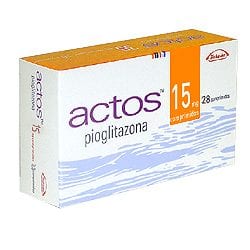 Takeda Pharmaceuticals Co. Ltd., the manufacturer of the best-selling diabetes drug in the world, may soon be a participant in hundreds of lawsuits amid suspicions that the drug increases the risk of bladder cancer when taken for more than a year.
Takeda Pharmaceuticals Co. Ltd., the manufacturer of the best-selling diabetes drug in the world, may soon be a participant in hundreds of lawsuits amid suspicions that the drug increases the risk of bladder cancer when taken for more than a year.
Takeda discontinued its sales of the drug, called Actos, in France and Germany in June of this year after being pressured by drug regulators in those two countries.
The sales of Actos have continued in the United States and other European countries despite the warnings of both the Food and Drug Administration and the European Medicines Agency that research has linked the increased risk of cancer to the drug. However, doctors are being discouraged from prescribing the drug for patients who currently have or have had bladder cancer.
Actos made its debut over a decade ago as a promising treatment for Type 2 diabetes, with heavy promotional hype surrounding it. The decision to take it off the market would limit the choices of diabetic patients in their treatment options.
Actos seemed to be a wonder drug when it was introduced. Taken once a day, the pills offered good blood glucose regulation with no side effects reported in the majority of patients. Actos was different from most diabetes drugs in that it worked by restoring the body’s insulin sensitivity. Patients could also reduce their dependency on insulin injections.
Though it had links to increased risk of heart failure admit other serious side effects, Actos took the spot as the best-selling diabetes drug in the world, knocking off Avandia once that drug was proven to severely increase the risk of heart complications. The EU banned Avandia and it was heavily regulated in the United States while Actos saw a huge spike in sales, jumping from $2.9 billion in 2006 to over $4.3 billion in 2010. However, it appears that the fortunes of Actos, and Takeda, have run out.
The first lawsuits concerning Actos’s link to bladder cancer were recently filed, with thousands more expected soon. The lawsuits claim that patients who took Actos daily over the course of several years developed bladder cancer—sometimes fatal.
Nancy Rios is just one plaintiff filing a suit against Takeda. Rios, a 54-year-old resident of Reading, Pa. who works as a hospital secretary, alleges that Actos is responsible for her recurring bladder cancer, with which she was first diagnosed in 2009. This June saw Rios having her second tumor-removing surgery; she says she is now worried about being forced to miss work, being unable to pay medical bills, or even losing her bladder and requiring chemotherapy.
Rios is represented by Paul Pennock of Weitz & Luxenberg. “When a manufacturer distributes a drug, they owe it to the public to ensure that their product is safe for use and it appears that Takeda Pharmaceuticals failed to fulfill that fundamental duty,” said Pennock.
Takeda declined to comment on the lawsuits, although spokeswoman Elissa Johnsen referenced a study in the journal Diabetes Care that Actos “use for more than two years was weakly associated with increased risk.”
The lawsuits may have dire consequences for Takeda Pharmaceuticals. According to Erik Gordon, analyst and professor at the University of Michigan Ross School of Business, the safety questions are a “big deal” for Takeda. Their patent on Actos will run out in August 2012 and they will likely see a decrease in sales in those final months, leaving them with less money to invest in two new drugs that were to be the successors to Actos.
“One, alogliptin, has been stuck at the FDA over safety concerns, and the other, a combination of alogliptin and Actos, now looks doomed,” said Gordon.